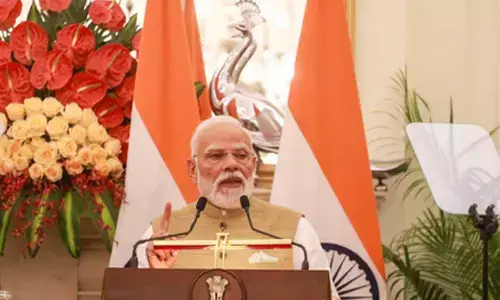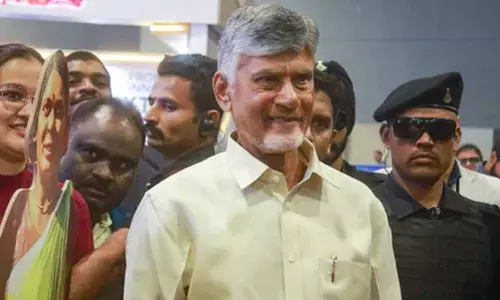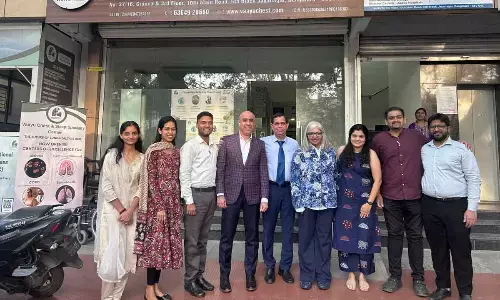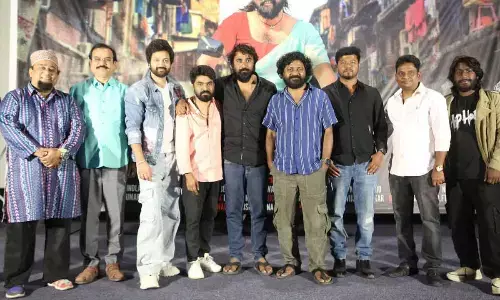MyVoice: Views of our readers 18th February 2024

MyVoice: Views of our readers 9th February 2026
In a landmark judgment, the Supreme Court bench unanimous decision to strike down electoral bonds on the ground that the scheme violates RTI gives a big boost for transparency to the poll process is without an iota of doubt is absolutely correct
Electoral bonds akin to electoral frauds
This refers to the editorial "SC upheld principles of free & fair elections" (17 Feb). The SC ruling on which I would like to call as "Election Fraud Scheme" can be termed as lucky for the voters. The political funding scheme was floated by late finance Minister Arun Jaitley and "Man Friday". It was a fact that the former RBI Governor Urjit Patel who quit for personal reasons warned about misuse of electoral bonds but the government didn't either pay heed to RBI issuing physical bonds and be an executor rather than a bank which works under their guidance. The fact of the matter is anonymous donations via electoral bonds was nothing but a stronger bonding between the party in power and large business houses who are looking for policy changes that help to make more money. Even after the SC ruling, the BJP has no qualm in claiming it was moved for transparent political donations. Business houses who are contributing to political parties are not in the business of charity, whatever they contribute are included in the cost of a product or service.
N Nagarajan, Hyderabad
***
In a landmark judgment, the Supreme Court bench unanimous decision to strike down electoral bonds on the ground that the scheme violates RTI gives a big boost for transparency to the poll process is without an iota of doubt is absolutely correct. Notwithstanding, electoral bond scheme introduced by BJP government in 2018 that allowed anonymous corporate contributions to political parties, the bench banned fresh issue of bonds and directed SBI to stop forthwith issue of bonds on the ground that they were too non-transparent due to political misuse of the scheme via shell companies is a welcome step. Even though it solved the earlier problem of massive amounts of cash and black money used to finance elections on one hand, yet Supreme Court's decision revives another by making donors vulnerable to political vendetta giving incumbent governments ability to target them. Ostensibly, a question arises is while transparency cannot by itself ensure free and fair elections, one thing clearly emerges out that there are no easy solutions to the problem of funding elections.
K R Srinivasan,
Secunderabad
***
The SC judgment on the election bonds scheme was a landmark and historic judgment. The court said there is no transparency, and it is not legal to have electoral bonds, and it is a very good lesson to the political parties, as they may favour the corporates for getting more funds through electoral bonds, and it is unconstitutional. We need to appreciate the 5-member judge team headed by the Chief Justice of India, Chandachud, for the historic judgment for imposing confidence on voters and on transparency of funds. The basic right to information about political funding was violated.
Kanagiri SN Prasad, Hyderabad
***
The SC ruling emphasized that the scheme, designed to facilitate anonymous political donations, violated the fundamental right to information enshrined in Article 19(1)(a) of the Constitution. Regarding the government's argument that the scheme combats black money, the court invoked the proportionality test from the KS Puttaswamy case on the right to privacy. It asserted that the government failed to adopt the least restrictive methods, citing examples like the Rs20,000 cap on anonymous donations and the concept of Electoral Trusts. The court highlighted the undue influence of companies in the electoral process, violating principles of free and fair elections. In summary, the Supreme Court's verdict not only declared the electoral bond scheme unconstitutional but also questioned amendments enabling anonymous political contributions, signaling a commitment to upholding transparency, accountability, and the democratic principles enshrined in the Indian Constitution.
Amarjeet Jumar,
Hazaribagh, Jharkhand
***
The information about the issued bonds that will be placed in the public domain before the Lok Sabha election will reveal the extent of quid pro quo involved in the transactions between political parties, especially the ruling party and big corporate donors. If favours, in the form of contracts, concessions or commissions or benefits from policy measures, given by the party in power in return for donations by wealthy individuals and corporate behemoths, come to light, the Opposition may use them to put the BJP on the defensive and explode the myth that it is ‘a party with a difference’. While the apex court has scrapped the electoral bonds scheme as unconstitutional and arbitrary, it has upheld the voters’ right to information as paramount, sacrosanct and inviolable, clearly striking a blow for transparency and democracy. Disclosure of political funding is vitally important for the sanctity of politics and elections.
G David Milton, Maruthancode, TN
***
Electoral bonds have given an immense advantage to the BJP through money power in successive elections. The bonds ensured BJP’s spectacular show in successive elections. Secret donors have donated Rs 16,000 crore to political parties as per the figures available with the RBI. 57% of this has gone to the BJP. The Congress is the second largest beneficiary. Immediately following the court order, the Income Tax Department froze 2.1 billion rupees of the Congress Party. This has conferred significant advantage on the ruling the ruling party. This move by the Income Tax Department has added to poor and unfair gamesmanship of the BJP, against an opponent which is already on the back foot due to many reasons.
Dr George Jacob, Kochi
***
The point is why the donors’ names should be held in secrecy. It is only to hide the quid pro quo that could possibly arise out of such donation. A corporate can make a donation of crores of money to a political party and its shareholders have no right to know to whom it is given under the scheme. The donors making donations to opposition parties will be under the radar of the government. BJP is the biggest beneficiary under the scheme having garnered Rs 6,566 crore. Once the data sees the light in the wake of the court order, public will know how much money is given by whom to whom. The interesting thing is the BJP government went on making amendments to many laws and acts like Income tax act, Company law to fortify the anonymity more and more. The great judgment is a blow to the BJP not only on moral and ethical grounds but also in financial terms as the elections are around the corner. It has given hope to all those who have given up hope in democracy because of such ill- founded schemes and strategies.
Vinay Bhushan Bhagwaty, Hyderabad
***
The voters have gained back their trust in democracy, after the verdict of SC on political donations. BJP termed the Electoral Bond Scheme a step towards electoral reforms. They should have explained how secrecy and not transparency of political donations by political parties was a good reform. BJP is widely accused of aiding Adani group to get airports, infrastructure projects, coal, energy and even railways. In the absence of transparency it will be presumed a quid pro quo exists for donations by Adani to the ruling party. Timely intervention by the Supreme Court has saved the democracy, as it directed SBI to disclose the donors’ identity.
P R Ravinder, Hyderabad
***
The formulation of the scheme is questionable. When any citizen, or a corporate entity can park his funds in a bank to make it available for a political party to utilise it without disclosing his /her or the corporate entities name or credentials, it gives rise to questions of suppressing transparency. After 7 years, the SC terming the scheme unconstitutional should make the political parties return/refund the monies to the payees. The SC has not come out with any directives in this regard. ECI putting up the details of the payees with the amounts contributed by them on its official website will reveal the extent of black monies which they tried to hide & convert with the help & connivance of political parties. Will the ED or the CBI or other investigative agencies try & prosecute them if they are found to have black money is a question which remains to be seen.
N R Raghuram Hyderabad
Lines between RS, LS are blurring
Rajya Sabha provides a platform for seasoned politicians, scholars, professionals, and social leaders to contribute to policy discussions. Its Members (MPs) are supposed to have accumulated experience and wisdom in various fields, so that they bring diverse perspectives due to their varied backgrounds, expertise, and life experiences for benefit of the country. The Rajya Sabha serves as a forum for thoughtful deliberation on legislative matters, as they are required to review and amend legislation proposed by the Lok Sabha.
Seasoned politician is one of the categories of MPs of Rajya Sabha because his/her knowledge, experience, and practical wisdom contributes effectively to the political process and serves the public interest. Hence, a seasoned politician, in majority of cases, cannot be below the age of 60 years. Similarly, members of other categories too, need to be of that age group to achieve excellence in the respective fields. But out of 235 members, 96 are below the age of 60 years in the present Rajya Sabha.
Of late, youngsters who served as MLA or MP (Lok Sabha) or failed to get elected or cannot contest polls due to ill health, spokespersons of political parties and as reward to individuals who favoured parties, are being accommodated as members in the Rajya Sabha. Also, politicians from other parties are being attracted to defect with the offer of nomination to Rajya Sabha.
In view of the above, is Rajya Sabha becoming a “House of Politicians” and can it remain as the “House of Elders”? If not, what is the difference between Lok Sabha and Rajya Sabha?
Dr O Prasada Rao, Hyderabad
Curb child porn
Recently a judgement came out from the Madras High Court, ruling that downloading the child pornography content is not punishable as a youth merely downloaded the relative content on to electronic gadgets and watched it in private. Child pornography is a heinous crime in India and worldwide that involves the creation, distribution or possession of sexually explicit materials featuring underage individuals and leads to the exploitation and abuse of a child. It holds deep implications on the mental health (behavioral and psychological aspect) of the child and well-being of the society at large.
Weak mechanism of tracing these offenders and frail laws aggravated the problem. There is existence of multiple stringent laws and penalising provisions across globe likewise Budapest Convention punishing all forms of cybercrime, internet threats and child pornography, forming European countries along with U.S. as members; INTERPOL'S International Child Sexual Exploitation Database maintains the database and tracks down the offenders. Regulatory norms that exist in India against this heinous act is POCSO (Prevention of Child from Sexual Offence Act) which even imposes death penalty for aggravated sexual assault on children, and Information Technology (IT Act, 2000) provides for explicitly harsh punishment. In spite of all such stringent and strict provisions, still there is continuous rise in the cases. This stresses the need to strengthen the legal framework and use international cooperation in our genuine fight against child sexual abuse.
Dimple Wadhawan, Kanpur
Congress fails to play a constructive role
Ref: Ram temple to farmers agitation, opposition missiles misfire – V Ramu Sarma: Bold Talk. (February 17, 2024). As Prime Minister Narendra Modi proclaimed that people are his “Suraksha Kavach,” the planned activities and programmes initiated by the BJP-led NDA government are progressing unhindered through the minefield laid by the Congress in diverting national attention through various means – ranging from Sri Ram temple to farmers’ agitation 2.0. The previous participants in farmers agitation themselves say the present movement is hijacked by radical, rowdy elements. If only the Congress extended its constructive support and involvement in the current nation building; things could have been enormously different – but, sadly enough, that is not the case in the country. Coming to power takes the priority and precedence for any political party worth its salt.
The Opposition wasted the entire Parliament secession citing preposterous issues, and clinging to them rigidly. Several vital Bills were passed through voice vote, without any active debate and participation by the Congress and others that people of the country have watched with dismay. The needless rant on caste census seems to be an active agenda that is close to the Congress’s heart. The farmers loan waiver policy was that was prevalent during the Congress rule was the killer of farmers’ motive in agriculture, and the waiver route seemed more suitable for Congress in shoring up the fortunes of the farmers; while it is blaming the NDA government for not doing enough, though the government is systematically ensuring farmers’ uplift. The muddied farmers' cause is not that easy to be tackled as it requires unbridled support and cooperation of all political parties and farmers groups, without any agenda to grind the axe.
S Lakshmi, Hyderabad
***
The Congress rule in the country, in the name of secularism was more in line with the British rule of India, to be grossly indifferent to overall progress and development of the country, in all spheres, failing to make the country strong and self-reliant in terms of defence; and in pursuing a foreign policy that is unique to India’s interest and advantageous to territorial sovereignty. One can clearly see the pattern that is being played out by Congress to be always in terms of dividing India, when it comes to abrogation of Article 370 in J&K, and failing to be constructively inclusive. The Congress openly courted the company of divisive forces, and Pak proxies in the Kashmir Valley that suited the cunning agenda of Pakistan, in keeping alive the Kashmir issue by needlessly internalising it, and even wanting the UN intervention, demanding even a plebiscite. By the very admission of tall leaders of Congress, who endured the insult and domination by the coterie – like ex President Pranab Mukherjee – narrated in their autobiographies about the distinct dislike of Sonia Gandhi towards Hindus – perhaps due to her Italian origin that answers Congress’s non-inclusive approach with regard to India’s rich cultural heritage and vibrant religious tapestry.
K R Venkata Narasimhan, Madurai
Glorification of violence in Indian films shocking
In present-day films, filmmakers are portraying violence as an essential element. Due to this phenomenon, people in general, and youth in particular, started to think that one would be considered as a hero, if he violently punishes villains. What disturbs is that filmmakers are portraying heroes as the personalities that are against abiding by law and order. What can the moviegoers learn from this, except emulating these undesirable things and spoiling themselves?
Some South Indian directors are stuffing their cinemas with as much creepy and violence-filled scenes as possible. In the films of the kind of the old, leading actors were pious, just, well-disposed, law-abiding and above board personalities. Whereas in present-time films the personality of male leads is with brimming animosity, spite and aggressiveness. Retaliation has become one of the important personality traits of male leads. Bizarre outfit, cocksure attitude, spicy jokes towards women and intimidation are some other weapons of heroism. Violence acted out by the protagonist is a sign of strength and courage and something to feel proud about.In the films that were hitting the screens until some two decades ago, heroes used to win the hearts of their lovers with their upstanding behaviour, charity and with academic excellence. Quite contrary to this, heroes in current-day films are required to kill, to win their lovers. What is perplexing is that even female leads worship the aggression of heroes and their violent behaviour is cheered by them.
The fragrance of peace, brotherhood and love must be spread from films. Filmmakers should not see cinema as a money-spinner. They should think it as a medium to provide inspiring stories with the society.
K Manoj Kumar, Huzurabad
Govt apathy, denials fuelling farmers’ stir
Farmers have hit the streets again in protest with their 21-point charter of demands. Their main demand includes legal guarantee for MSP for their wheat and rice crops besides cancellation of agreements impacting agricultural sector, minimum pension of Rs5,000 for farmers and agricultural labourers and waiver of loans to all farmers. It cannot be denied that increasing agricultural production is crucial for the country's economic progress.
The farmers sector needs people's support since they feed the people round the year. But the demand for MSP for crops like rice and wheat as per Swaminathan Commission report should not be implemented in haste. It needs a good debate to arrive at a decision. Also it is unviable and not doable as it will drain the state exchequer. The Congress too by then, dumped this report.
Secondly, agricultural needs are to be modernized according to the demands of time. Research and reformation is very significant in this field to increase production commensurate to the demands. Thirdly, the farmers’ agitation is turning political and violent. Opposition is taking advantage of the situation and try to paint it in political colour.
N R Ramachandran, Chennai
***
The contribution of agriculture to GDP, which was around 50% when the country got freedom, is now reduced to around 14%. The Green Revolution promoted by the then rulers saw the country’s transformation from food dependent one to food surplus one. But subsequent policy changes by successive rulers saw farm sector lingering around multiple issues resulting in lakhs of agrarians resorting to suicides. Government investment in agriculture and rural development saw a decline from 43% to around 18%. Government is still not cleared off its confusion between WTA and Free Trade Agreements.
It was in this background the ruling party came with a promise of doubling the income of farmers before the year 2023. Just to attract the votes of the rural farmers the party made an attractive promise of Minimum Support Price (MSP) at least one and a half times the comprehensive cost of production according to the C2+50% formula. It did help the party in garnering sizable rural votes but the high hopes of the voters were shattered when the government filed an affidavit in the Apex Court asserting that it would not be possible to fix MSP.
Several policies related to the farm sector announced by the government suffered multiple issues and the schemes still go around as mere slogans. The government came out with around 30,000 clusters to promote organic farming and allotted Rs.800 crore. But most of this fund has subsequently been shifted to M.P, Rajasthan and Uttarakhand. Prime Minister Fasal Bima Yogna is seeing a decline in enrolment due to inbuilt fault lines in the scheme. In short the whole rural crisis could be better understood by understanding the fact that the ratio between urban and rural income is 7:1.
The farmers are now pushed to wage another major democratic protest movement in the national capital. This prompted government overreactions like nailing and blocking the approach roads and crudely treating the farmers with water canes and teargas. Such reactions resemble the scenes of dealing with an external aggressors rather than its own aggrieved people. The government should keep in mind that it was for having shot 6 farmers dead in MP that the voters defeated the party and it had to recapture the government by undemocratic means. It is said that taking over a country would be easier by destroying the agriculture and education level of the country. Is it true?
A G Rajamohan, Anantapur








